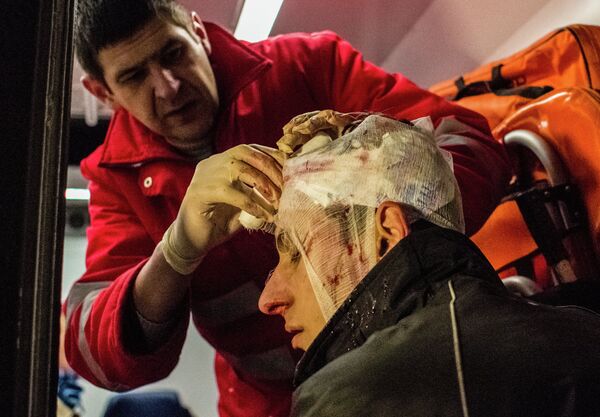MOSCOW, November 30 (RIA Novosti) – Riot police dispersed early Saturday a protest against Ukraine’s bailing out on European integration, local media said, with reports speaking of dozens of injured and detained.
Berkut special police cracked down on protesters camping out in the Independence Square in the capital Kiev, the venue for the “Orange Revolution” of 2004, Channel 5 television said.
Police wanted the square cleared so that a Christmas tree could be set up there, Tsn.ua news website said.
Police also accused participants of the eight-day protest of “violations,” including throwing stones at officers, Liga.net said.
Berkut squads chased the fleeing protesters, beating them up with truncheons and dragging them by their feet, opposition lawmaker Andriy Shevchenko said on Twitter.
Ukrainian media also cited eyewitness accounts speaking of beatings and indiscriminate detentions at the Independence Square.
Thirty-five protesters were briefly held, a police spokesman told RIA Novosti.
He said police was looking into media reports about 40 people injured at the square.
About 1,000 people were at the square at the time of the crackdown, Tsn.ua said.
The Ukrainian Interior Ministry recently reported that 12 police officers were injured in clashes with protesters and two criminal investigations had been launched on charges of hooliganism and resistance to authorities.
US Ambassador to Kiev, Geoffrey Pyatt, denounced the crackdown, as did the foreign minister of current EU chair Lithuania.
The Ukrainian Parliament Commissioner for Human Rights, Valeriya Lutkovska, said on Saturday that her office analyzed video recordings of the events in Kiev and concluded that police used “excessive” force in clashes with protesters.
Lutkovska said her office would open its own investigation into police actions during the crackdown.
Meanwhile, Ukrainian President Viktor Yanukovych said in an address to Ukrainians, posted Saturday on his web site, that he was “deeply outraged” by violence and injuries in Kiev.
Yanukovych vowed that those responsible for the violent confrontation would be punished after an immediate and objective investigation. He did not specifically blame the police for the violence, though.
Ukrainian Prime Minister Mykola Azarov said in his Facebook blog that he was "deeply outraged and concerned" by last night’s events in Kiev and promised a thorough investigation that would involve prosecutors.
Azarov also said the Ukrainian authorities were not interested in provoking an escalation of tensions and remained committed to stability in the country.
In the wake of the crackdown, Ukrainian opposition figures voiced calls for the sacking of the country’s police chief, as well as snap presidential and parliamentary elections, now set for 2015 and 2017, respectively.
Arseniy Yatsenyuk, the leader of the Batkivshchyna (Fatherland) parliamentary faction, said Saturday that his party, the nationalist Svoboda party and the Udar party had agreed to set up a “national resistance” headquarters and start preparations for a nationwide strike.
"We have made a joint decision to form a national resistance headquarters and have begun preparing for an all-Ukrainian national strike," Yatsenyuk said at an emergency briefing in Kiev.
Yatsenyuk also said opposition leaders would meet on Saturday with ambassadors representing the European Union to discuss the political crisis in the country.
Ukraine faced a wave of protests after President Viktor Yanukovych unexpectedly refused to sign a association agreement with the EU earlier this month, opting instead for an alliance with Russia.
A spate of rallies by pro-EU protesters took place across the Eastern European nation over the past week, including in Kiev, where up to 100,000 rallied last Sunday.
Street protests have brought down a previous pro-Russian regime in Ukraine in 2004. Up to 1 million people rallied at the Independence Square at the time.
Updated with comments from President Viktor Yanukovych’s address to the nation.


